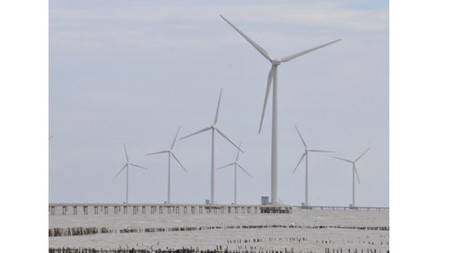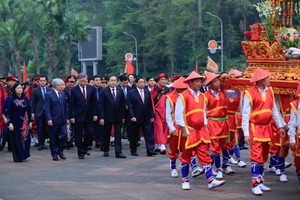
The Institute of Strategy and Policy on Natural Resources and Environment (under the Ministry of Natural Resources and Environment) explained that in the period from 2011-2019, propaganda activities to raise the awareness of the public were successfully launched in several regions nationwide.
In addition, the mechanism to deal with possible issues caused by climate change has been established in both local and national levels. Policies for this matter have been integrated into other fields like planning, power management, transport, construction, waste management, water resource management, and agriculture.
Particularly, in construction, Ho Chi Minh City (HCMC) has applied solutions to reduce waste release in buildings while asking investors to focus more energy conservation.
As to transport, data collection in sea ports to estimate greenhouse gas release has been done to lessen this problem.
Regarding agriculture, HCMC has promoted the use of biogas technology to handle cattle droppings, gradually replacing fossil fuel. Meanwhile, the propaganda of basic knowledge to cope with climate change to farmers has been carried out properly.
Private sectors are actively participating in forest protection activities, wind and solar power development. Many major research projects and scientific programs have been carried out.
Vietnam is actively fulfilling its responsibilities in accordance with the Paris Agreement and the Kyoto Protocol.
Along with the collaboration with other developed nations such as Japan, South Korea, France, Holland, and the US, Vietnam is whole-heartedly working with the World Bank, the United Nations, and the Asian Development Bank as well as other international organizations to use both technology and human resources to finish all proposed goals related to climate changes.
Lately, the World Bank has approved a loan of US$84.4 million for Vietnam to reform its policies to improve the ability to cope with climate change while protecting its existing natural resources, developing its transport and green energy.
Director of the Agence Française de Développement (AFD) in Vietnam Fabrice Richy stated that until now, AFD has delivered more than €1 billion to financially support 30 Vietnamese projects and programs concerning climate change. In the near future, the cooperation between the two partners will be stronger to fulfill Vietnam’s commitments in the Paris Agreement.
Director of HCMC Department of Natural Resources and Environment Nguyen Toan Thang shared that the city is implementing the project to transform into a smart city. In this project, the monitoring of environmental ratings and their effects is launched throughout the city to create a healthy environment for its residents.
In the upcoming time, HCMC is going to work with C40 Cities Organization, where it is a member, to carry out several program to alleviate negative impacts of climate change in the city. It is also going to collaborate with Holland in programs about water resource management, urban flooding control.
In addition, HCMC is going to cooperate with Osaka City to launch many project using the Joint Crediting Mechanism (JCM), with the Japan International Cooperation Agency (JICA) in the project to Support the Planning and Implementation of NAMAs in a MRV Manner (SPI-NAMA).
























